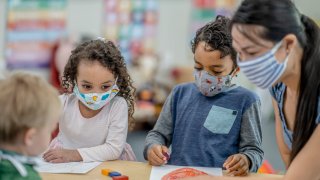
Now that coronavirus-related restrictions have lifted throughout Massachusetts, the state is asking early education and child care centers to implement their own COVID-19 policies.
As of midnight Saturday, Gov. Charlie Baker’s mask mandate and all remaining COVID-19 restrictions expired in Massachusetts, and with it, the Massachusetts Department of Early Education and Care (EEC) retired its minimum requirements for health and safety and COVID-19 Child Care Playbook and eliminated all COVID-specific requirements for child care.
The state is now asking child care programs to incorporate their own policies specific to preventing the spread of COVID-19. The EEC released a list of suggested strategies for preventing and responding to the disease on the state's website.
The strategies include policies around face coverings, symptom checks, visitors, air ventilation and sanitization. The department will begin in-person monitoring for programs after July 1.
Get Boston local news, weather forecasts, lifestyle and entertainment stories to your inbox. Sign up for NBC Boston’s newsletters.
At this time, EEC recommends that unvaccinated staff, educators and children ages five and older continue to wear masks both inside and out when unable to maintain physical distance. Children do not have to wear masks nor maintain distance when outdoors.
The state suggests other measures including limiting unvaccinated visitors, opening windows to allow fresh air, holding activities outside as much as possible and using fully vaccinated adults to serve as “floating” staff between groups.
Programs are still required to maintain COVID reporting structures for both exposures and positive cases that occur within their sites until further notice.
Suggested Strategies
- Monitor for symptoms and stay home when sick or if exposed to a COVID-19 positive individual
- Have a clear, consistent visitor policy
- Increase ventilation and circulation of fresh air
- Promote physical distancing and smaller groups when indoors
- Promote frequent hand hygiene
- Isolate sick or symptomatic individuals
- Continue routine and targeted cleaning practices
- Modify health and safety practices for special populations
- Track community risk
- Use DPH’s testing and return to care protocols
EEC will continue to update the suggested strategies regularly to support programs in keeping their own policies up-to-date, as COVID vaccinations continue to increase and cases continue to fall. Programs are also encouraged to monitor the CDC website for relevant guidance.



